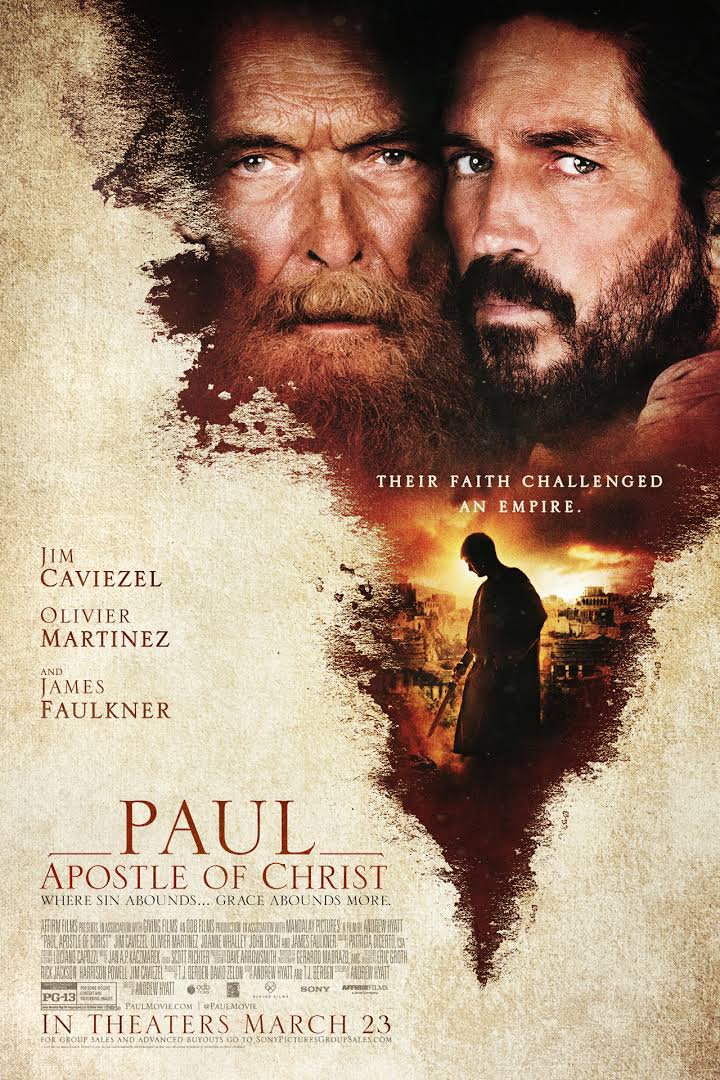April 6, 2018
The new movie, “Paul, Apostle of Christ,” took a lot of work to make the story work. The co-writer and director, Andrew Hyatt, had to do some heavy lifting to construct a narrative to both tell a story and carry his Gospel message. I found it took an effort to follow how the various storylines intersected and make the leaps of logic the story required.
Having said that, the film was better than I expected but not as good as I wanted. The international cast was of professional quality, as you would expect from a major studio release. The film comes to us from Affirm Films, which is the faith-based division of Sony. Theologically I found it affirming of what I believe the gospel message to be. But, the script left something to be desired.
The story focuses on Luke, the Greek physician and evangelist, who comes to Rome to visit his old friend Paul and extract from him wisdom and an exhortation for the struggling Christian community at Rome, which is living under the grave persecution of Nero. Luke stays with the Christian commune hosted by Pricilla and Aquila. We see flashbacks to Saul the murderer of Christians and his tortured conscience. We see the various tortures he suffers. Layered in is the story of Mauritius (Oliver Martinez), a Roman general in charge of the Mamertine prison, where Paul is being held. We are dragged into Mauritius’ domestic drama, which includes a much beloved and slowly dying daughter. Luke’s day job as a doctor becomes a key plot point that saves Luke’s life, allows the Christian com’munity to escape Rome and gives Paul an opportunity to share the gospel message with Mauritius, who stands in for conflicted pagans everywhere. The climax of the story ends with a sword, the iconic symbol of Paul.
The writers have a rather tortured way to explain how Luke got into the Roman prison to interview Paul so that he could write what we are to assume becomes the Acts of the Apostles. The more biblically astute viewers can have fun playing the game, “What’s in the New Testament and What’s Not.” The story takes characters (Priscilla & Aquila) and quotes from the New Testament and uses historical facts; the fire in Rome that Nero blamed on the Christians and Christians being killed as circus entertainments, to construct the skeleton of the story. I did like the way the New Testament quotes were incorporated into the dialog. Usually, this is the more clunky part of biblical movies but in the mouth of James Faulkner the scripture passages work.
The script problems came from the multiple narratives that were necessary to create the conflict that drove the story. Usually, there is one protagonist and the choices of that protagonist in opposition to the conflict in his life drive the story. When a movie is about Paul, The Apostle of Christ, you expect him to be in most of the scenes. I felt my attention was split between multiple protagonists; Paul, Luke, Pricilla & Aquilla, and Mauritius all claimed my attention in an almost equal measure.
The co-writer and director, Andrew Hyatt, is a proponent of something he calls, “Sacred Art House.” His previous feature, “Full of Grace,” was about the last days of the Virgin Mary. It won the best screenplay at the Vatican film festival in 2016. All his credits seem to be faith-based projects. In this film, Hyatt borrowed some slow motion dripping blood effects from Mel Gibson’s “Passion of the Christ” but made his own the image of Christians as burning torches lining Roman streets at night. I guess “Sacred Art House” films have a high yuck factor.
I particularly liked James Faulkner, who played St. Paul. He is a prolific British TV actor (“Game of Thrones,” “Downton Abbey,” “Borgia”) who brought a gravitas and nobility to the character I had not seen before in other portrayals of Paul. Jim Caviezel (“Passion of the Christ”) who plays Luke, was better than usual. Usually, I find his characters wound way too tight, here he seemed to loosen up just enough to be believable. Oliver Martinez, known as “The French Brad Pitt” (he was briefly married to Halle Barry), is a good enough actor that you forgive his heavy French accent coming from the mouth of a Roman prison warden.
Bottom line: A good message about the Gospel of Love in what was clearly an overly labored labor of love from Andrew Hyatt and company.
Paulist Fr. Frank Desiderio is the first consultor to the president of the Paulist Fathers. He is a past president of Paulist Productions.
